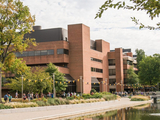in reimagined summer program
This story was written by Sarah Hansen and first appeared on news.umbc.edu
The 19 members of UMBC’s STEM BUILD Cohort 5 and their instructors had been looking forward to a summer wet lab experience. When that wasn’t possible due to the COVID-19 pandemic, they worked together to convert their eight-week, in-person program into a successful online learning experience unlike anything they’d tried before.
“It was different,” says Maria Cambraia, postdoctoral teaching fellow in the STEM BUILD program and one of the instructors, “but we kept the main goal. We wanted to offer them an authentic research experience, and we did.”
Independent exploration
This year, BUILD Trainees worked in groups to analyze the genomes of bacteriophages, viruses that infect bacterial cells. They also viewed and analyzed phages that previous UMBC students had isolated, including some that were unknown to science before the students discovered them. After some initial analysis, each group came up with its own research question to explore using bioinformatics tools.
“Students gain exposure to research techniques in the Bioanalytical Phage Module, but the larger benefit is their experience in self-directed research without predefined results,” says Steven Caruso, principal lecturer of biological sciences. “Because participants are engaging in real research, the experience is different every year.”
Caroline Moore ’23 (left, offset) presents her team’s research at SURF. (Screenshot from the SURF website)
Caruso has been teaching the Phage Hunters lab to UMBC students since 2008, and he adapted the full-length course for STEM BUILD five years ago. “This experience prepares them for their next step, working with an individual mentor in their own lab,” he says. “It also allows them additional opportunity for productive collaboration with their peers, and for scientific communication during lab meetings and poster presentations.”
Feedback for success
At the end of the eight weeks, the students presented their findings at UMBC’s virtual Summer Undergraduate Research Fest (SURF). The VoiceThread platform allowed students to give and receive feedback in written, audio, and video format, all in real time.
“Leading up to SURF we practiced using VoiceThread and got tons of helpful feedback from our instructors,” shares Caroline Moore ’23, biological sciences. Even though the online format made some things more difficult, she adds, “I think having such a supportive cohort and instructors helped me push through and end up creating an amazing presentation.”
In addition to practicing with the platform, students presented updates on their work every week throughout the summer and got support with designing their posters. “Dr. Cambraia gave detailed feedback, which allowed us to develop skills for creating the abstracts and posters,” shares Angela Kim ’23, chemical engineering.
“We needed to teach them not just how to present, but instead, ‘This is how you present, and this is how you make it effective online,’” Cambraia says.
The students also received helpful feedback at SURF itself. “The questions our group received made me think about what can be improved in our research and gave me some ideas for future research as well,” Kim says. Sharath Velliyamattam ‘23, biological sciences, adds, “I learned from this experience to give visual cues, how to engage my audience, and I learned to interact with different types of people, from faculty to students.”
A new field and new confidence
The Bioanalytical Phage Module introduced many of the students to bioinformatics—and bioinformatics tools—for the first time. “The online bioinformatic work with our phage genomes was really interesting,” says Kevin Gibbons ’23, biological sciences. “I never thought I’d be interested in computational or bioinformatic work, but I feel like I gained a lot of skills that will be helpful no matter what type of research I do in the future.”
For Grace Tugado ’23, chemical engineering, the experience sparked a powerful interest in phages. “Whenever I went out with my family on hikes, I brought up phages and what we learned in lecture,” she says.
Overall, “I think this research opportunity has helped me become more confident in my ability to communicate in a research group and has made me better prepared to work collaboratively,” Moore says.
Angela Kim ’23 (left, offset) presents her research at SURF. (Screenshot from the SURF website)
Building connections
In addition to collaborating with their groups, Cohort 5 students had the opportunity to interact with previous BUILD classes. Cohorts 4 and 5 spent more than two hours discussing their experiences in a virtual meeting. Cohort 6, entering as first-year students this fall, also commented substantially on Cohort 5’s SURF posters.
Through those exchanges, “We really got a behind-the-scenes view of undergraduate research at UMBC,” Velliyamattam says. Throughout the summer, they also became part of it.
These students faced an unusual challenge: conducting independent research, in groups, all online. By the end of the summer, the students improved their presentation skills, learned about a new area of life science, and conquered new online analytical tools. They also bonded more closely as a group—strengthening relationships that will see them through challenges long after the pandemic is over.
Banner image: UMBC’s Biological Sciences Building along Academic Row, where STEM BUILD students would have traditionally completed their summer research experience. Photo by Marlayna Demond ’11 for UMBC.
- Attached Photo for UMBC STEM BUILD students conduct and present viral research
- Attached Photo for UMBC STEM BUILD students conduct and present viral research
- Attached Photo for UMBC STEM BUILD students conduct and present viral research
- Attached Photo for UMBC STEM BUILD students conduct and present viral research
Posted: September 5, 2020, 11:38 AM
